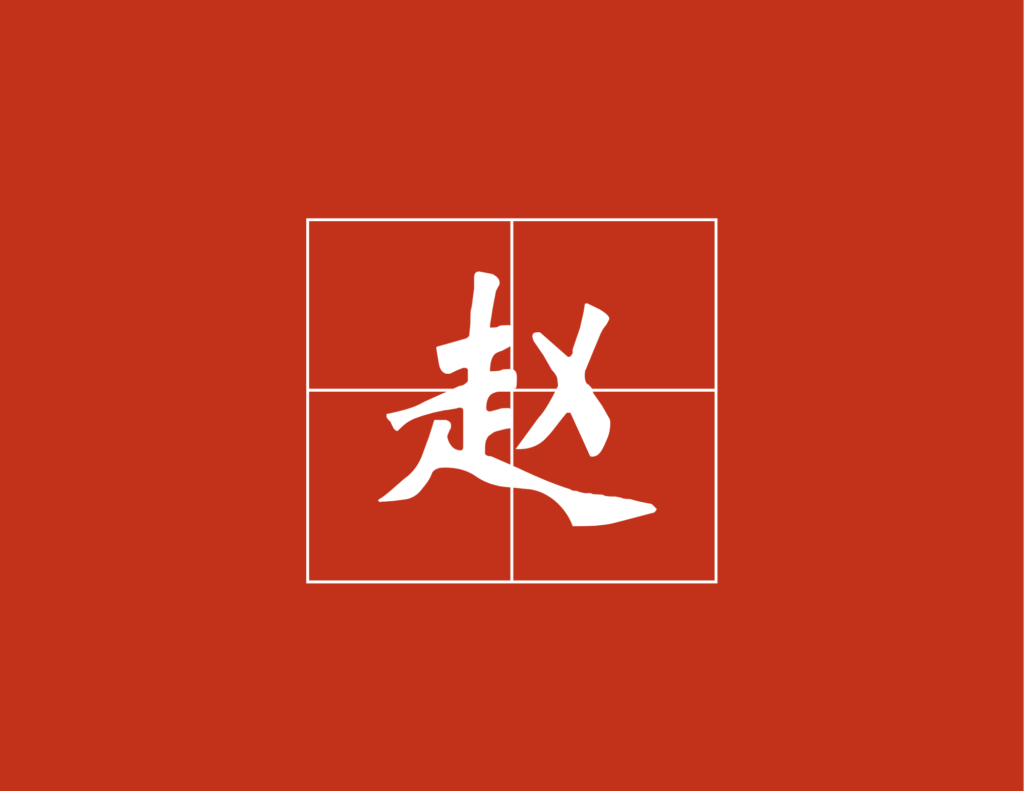In the world of Chinese surnames, some names walk. Others run. Zhao (赵) does both—with grace, history, and a flair for the dramatic. It’s not just one of the most common surnames in China; it’s also one of the most storied, carrying the weight of dynasties, dramas, and dictionaries on its finely structured shoulders. So let’s take a brisk walk—no, a purposeful run—through the legacy of Zhao.
I. The Character of “Zhao”: A Name That Moves
At first glance, 赵 may seem like just another two-stroke-smooth character in the Chinese lexicon. But take a closer look, and the meaning reveals itself. The character is composed of “走” (to walk or run) and “肖” (to resemble or imitate), a poetic blend suggesting motion toward greatness.
Think of it this way: Zhao isn’t content with standing still. It carries the implication of dynamic progress, strategic agility, and perhaps even a bit of charm. It resembles, it moves, it aspires. As a surname, Zhao seems to whisper (or shout, depending on the historical period), “We don’t just exist—we advance.”
II. Ancient Prestige: The Aristocratic Origins of Zhao
Zhao didn’t simply appear on the scene. It descended, rather elegantly, from the noble lineages of the Zhou Dynasty, one of the most culturally formative periods in Chinese history. Born of blue blood and bronze vessels, the Zhao surname was not so much adopted as inherited with gravitas.
And in case its résumé needed any more padding, Zhao holds the very first position in the famous Song Dynasty text Hundred Family Surnames (百家姓). That’s right—first. Not Zhang, not Wang, not Li. Zhao. First among equals, or more precisely, first because of the imperial family—but we’ll get to that.
III. The Zhao State: Legacy in Warfare, Wisdom, and Woe
You can’t talk about the surname Zhao without talking about the State of Zhao, a major player in the geopolitical rollercoaster that was the Warring States period. This was no minor fiefdom—it was a force to be reckoned with.
Figures like Zhao She, a brilliant general; Zhao Kuo, a famously tragic strategist; and Lian Po, a battle-hardened warrior, all walked the halls (and battlefields) of Zhao. Their stories are etched in textbooks, scrolls, and the collective memory of Chinese military lore.
Though the state eventually fell to Qin, it left behind more than artifacts and cautionary tales. It left a surname that endured long after its borders were erased—the ultimate mic drop in the annals of dynastic drama.
IV. Confucian Nobility and the Zhao Ethos
But Zhao wasn’t all swords and siegecraft. It also had a brain—and a conscience. Deeply embedded in Confucian ideals, the name became synonymous with loyalty, moral integrity, and duty.
Throughout history, many Zhaos have served as officials, scholars, and philosophers—people who thought deeply, acted nobly, and dressed quite well, if the paintings are anything to go by. Being a Zhao wasn’t just about honor by birth; it came with cultural expectations. One was expected to be upright, eloquent, and preferably good with a brush.
No pressure.
V. The Imperial Zhao: From Dynasty to Social Signal
Then came the Song Dynasty, and with it, Zhao Kuangyin, the founding emperor. With a swift military coup and a well-placed cup of wine (true story), he established a dynasty—and made Zhao an imperial surname.
From that moment forward, Zhao wasn’t just noble; it was divinely sanctioned. In fact, the name became so associated with royalty that later dynasties treated it with kid gloves, even avoiding its use in certain official contexts. Name-dropping, quite literally, became a delicate affair.
For centuries, “Zhao” carried with it the invisible weight of power—a sort of aristocratic aura that lingered in conversation like fine incense.
VI. Cultural Presence: Literature, Loyalty, and Legacy
The surname Zhao is more than a historical artifact—it’s also a literary legend. In The Orphan of Zhao (赵氏孤儿), one of China’s earliest and most enduring tragedies, the name stands for loyalty, self-sacrifice, and national virtue. Think Shakespearean drama meets Confucian ethics.
In art, Zhao Mengfu, the Yuan Dynasty calligrapher and painter, left a legacy that continues to inspire students and curators alike. His work is the visual equivalent of a perfectly steeped cup of tea: subtle, refined, and timeless.
The surname became shorthand for a certain kind of cultural depth—elegant, composed, and just a touch mysterious.
VII. Linguistic Elegance and Global Recognitio
Phonetically, “Zhao” stands out. It’s short, distinctive, and carries a commanding presence. In a world where surnames can sometimes blur together, “Zhao” says, “You’ll remember me.”
Visually, it’s a favorite in calligraphy and seal carving—symmetrical, balanced, and aesthetically satisfying. Even those unfamiliar with Chinese characters are often drawn to it, like moths to a finely inked flame.
One could argue that “Zhao” is the surname equivalent of minimalist luxury—nothing excessive, but quietly powerful.
VIII. A Surname That Starts Conversations
Ask someone with the surname Zhao about their family history, and you’re likely to get a smile—and maybe a story. “Are you from the royal Zhaos?” is more than a joke; it’s an invitation to talk about heritage, legend, and identity.
In this way, Zhao becomes more than a name. It becomes a cultural passport, a spark for intergenerational storytelling, and a gentle reminder that history isn’t just found in books—it’s found in people.
Conclusion: A Name That Moves and Matters
In the grand orchestra of Chinese surnames, Zhao is the violin: elegant, expressive, and impossible to ignore. It carries ancient resonance, aristocratic authority, and an artistic spirit, all tied up in one beautifully balanced character.
Whether you’re tracing its origins through ancient texts or meeting someone who carries it into the future, one thing is certain: Zhao doesn’t just mean something—it moves something.
And it’s still moving.
